Don’t Be a Drone Disaster: The Risks of Flying Drones in Wildfire Zones 🛑🔥
Recently, an alarming incident occurred in Los Angeles that highlights the urgent need to respect operational airspace during emergencies. A drone collided with a firefighting plane, specifically a “Super Scooper,” while it was battling one of the worst wildfires in LA’s history. The consequences were serious: the firefighting effort was disrupted, the plane was damaged, and the ongoing investigation by the FAA aims to identify the drone operator responsible for this reckless act.
The Incident: Caught in the Act 🚁⚠️
On January 9, 2025, during heroic firefighting operations over the Palisades fire, a drone crashed into the Super Scooper, puncturing a hole in one of its wings. This incident demonstrates just how disruptive personal drone use can be in critical situations. Firefighting crews are already facing immense challenges with raging fires claiming homes and lives—allowing drones into the party is like inviting chaos into calamity.
The Danger of Distraction 🕵️♂️❌
Flying drones, especially for capturing videos of natural disasters, might seem like a fun idea; however, it poses significant safety risks. Not only does it distract emergency personnel, but it literally gets in the way of life-saving efforts. Drone collisions with aircraft can lead to disastrous consequences, resulting in grounded firefighting planes that can mean the difference between life and death.
With LA engulfed in flames and the death toll rising, one must ask: is filming really worth the risk?
Legal Implications and Consequences ⚖️💰
The LA Fire Department has made it abundantly clear: the law is on their side. If you decide to fly a drone during firefighting operations, you could face up to 12 months in jail or a $75,000 fine. This stiff penalty reflects the gravity of the situation and emphasizes the need for communities to take drone etiquette seriously, especially when the stakes are so high.
What Can We Do? Awareness is Key 🗣️💡
It’s crucial for all drone enthusiasts to educate themselves and spread awareness in their communities. Here are a few actionable steps:
-
Stay Informed: Regularly check local news and FAA regulations about prohibited airspaces during emergencies.
-
Share Knowledge: Discuss the legal and safety consequences of flying drones in sensitive areas with fellow drone operators.
-
Be an Ally: If you're aware of any upcoming wildfires, encourage people not to fly drones in those zones. Show support for emergency responders instead.
- Use Drones Responsibly: Only fly in designated areas and times when it's safe and permitted.
Conclusion: Think Before You Fly 🗺️❗
This unfortunate incident serves as a potent reminder of our responsibilities as drone operators. While we all appreciate the power of technology to capture moments, we must remember that certain moments demand our utmost caution and respect toward those risking their lives to protect us.
So, next time you’re tempted to get an aerial shot, consider the implications and choose safety over spectacle. Together, we can make a difference! 🌟
For more updates on this ongoing issue, please check out the full article on TechCrunch.

More Stories
Meta’s AR Ambitions and AI Safety: Insights from the Equity Podcast
Insight Partners Data Breach: A Wake-Up Call for Cybersecurity Awareness
Lovable’s Ascendancy: Anton Osika at TechCrunch Disrupt 2025